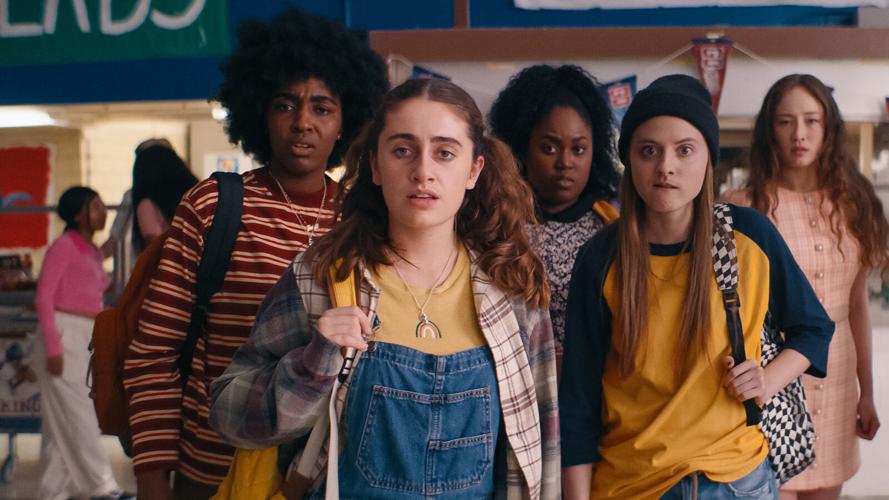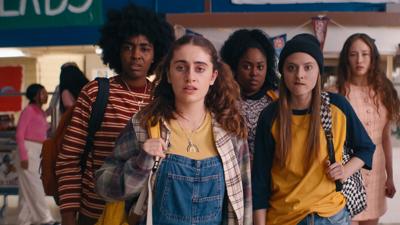Emma Seligman is giving mainstream audiences something they rarely get, the Jewish lesbian perspective, which she debuted in Shiva Baby (2021). This is Seligman's sophomore feature, and even though this film doesn't center exclusively around a Jewish lesbian, that perspective is still infused within the narrative and themes here. At first, I thought this film would be in the vein of teen sex comedies, such as The Last American Virgin (1982), Revenge of the Nerds (1984) or even American Pie (1999), but done from a Jewish lesbian point-of-view. In some ways, this film is that, but those aforementioned sex comedies were more raunchy than this film.
Yes, there's a lot of explicit and even blunt, sex talk in this film, but, in terms of visualizing or depicting sex, there's none of that here. Those aforementioned teen sex comedies had a lot of nudity for example, a lot of topless women and men, as well as other body parts flashed. However, Seligman's film has no topless bodies or nudity of any kind. It's strange for this film to be so forward with its sex talk but yet shy away from actually depicting it. Yes, there's implied sexuality or hinting of it, but no depiction or anything that shows us the acts that the characters desperately want. There's not a lot of exposed skin here.

Rachel Sennott (Shiva Baby) stars as PJ, the probable proxy for Seligman herself. PJ is a teenage Jewish lesbian who is seemingly a senior in high school about to go to college. She's seemingly a virgin and wants to lose that virginity before she graduates. Ayo Edebiri (The Bear) co-stars as Josie, the childhood friend of PJ who is also lesbian, a senior and a virgin. She also wants to lose her virginity before she leaves high school. So, basically, we have the same initial premise of American Pie and a premise, somewhat similar to Booksmart (2019). The reason that PJ and Josie believe that they haven't lost their virginity is not necessarily because they're gay or lesbian, it's because they believe they're ugly and untalented.
For PJ and Josie, they're not necessarily concerned with making friends at school or expanding their social circle within their immediate environment. They simply want to have sex, but this film makes it seem like they have no options unless they go to some extreme. The conclusion of the film would suggest that they didn't need to go to extremes. Much like The Wizard of Oz (1939), the conclusion suggests that the solution was simple or within them the whole time. This is a comedy, so going to extremes is often the whole point. We want to see characters in a comedy go to extremes and do ridiculous or over-the-top things because that's supposed to make us laugh.

Yet, in a teen sex comedy, one would think that the extreme and over-the-top things would be about teens having or pursuing sex. Coming from a gay or lesbian perspective, one would think the extreme and over-the top things would center around that specific perspective of same-sex attraction. That's somewhat true here, but the film leans into a gimmick that it concocts that really isn't about sex at all. PJ and Josie come up with this plan. Who actually originated the plan is a source of debate and later conflict, but PJ and Josie come up with a plan to create a fight club at their school, as a way of manipulating girls to be physical with them and eventually have sex with them. Yes, it's a gimmick that goes to that lesbian perspective and the themes we've seen in previous teen sex comedies, but it leans more on the violence of it all than the potential female homo-eroticism, which was the whole point.
I was reminded of Kirby Dick's This Film Is Not Yet Rated (2006), a documentary about Hollywood's rating system. Some of the conclusions of that documentary is that homosexual material is treated more harshly and scenes involving female orgasm are treated more harshly. The prime example was Jamie Babbit's But I'm a Cheerleader (1999), a film that featured female masturbation and more explicit lesbian sex. The 2006 documentary also concluded that violence, even graphic violence, is often more acceptable. As I watched this film, that dynamic felt at play. It felt as if this film was more accepting of the violence than it was the sex, specifically the lesbian sex.

Recent comedies focusing on gay teens have also shied away from sex. Geography Club (2013) and Love, Simon (2018) are two examples. Granted, those films were trying to be more family friendly and more mainstream. Arguably, this film is doing the same, but it feels as though it wants to be more raunchy and more bold. Yet, instead of sex, this film references David Fincher's Fight Club (1999) and wants to be an all-girl spoof of that, which is fine. There is a girl-on-girl kiss but the girl-on-girl punches are what the climax of this film really is.
Nicholas Galitzine (Red, White & Royal Blue) also co-stars as Jeff, the football player who is idolized as the king of the school. As is the case with most films set in high school, he's more or less the antagonist. All the football players or similar jocks are the antagonists. In any high school story that centers on the outcasts or the marginalized, the geeks, the nerds or the virgins, the jocks are typically the antagonists or the villains at odds with the main characters. It's cliché. It's a trope that was mostly deconstructed with the TV series Glee (2009), so it's a little lazy to see it repeated here, but the film is making the point of how football players are overvalued or over-appreciated. The film also makes a fairly good joke comparing football to homoerotic acts.

Going back to Love, Simon, I had a complaint or perhaps what is a misunderstanding of how young people, specifically those in Generation Z, navigate dating and sex. Love, Simon seemed to embrace the Internet in certain regard regards but ignore it in others. For example, the titular character never really acknowledges Grindr or other gay dating apps, which would have alleviated some of his issues of isolation. Grindr in particular is known as an app for hooking up or having sex, which could be excused in Love, Simon because Simon wasn't looking for sex in that film, which was another criticism of it.
However, the characters here, that of PJ and Josie are looking for sex, so why they wouldn't use Grindr or the lesbian equivalent, that of Scissr or even something like Tinder, is baffling. Some have argued that this film is a period piece set sometime in the past. I understand how that argument can be made, but the time period is never explicitly said and the absurdist nature of the film could mean that it is set in the present. The short answer though is that using those apps and the Internet would have meant that the plot of this film would be completely unnecessary, which is probably the funniest punchline that could have been put into this film. Yet, it wasn't. I laughed more at what wasn't here than what was. The outtakes are the prime example of that.
Rated R for crude sexual content, pervasive language and some violence.
Running Time: 1 hr. and 31 mins.
In theaters.











